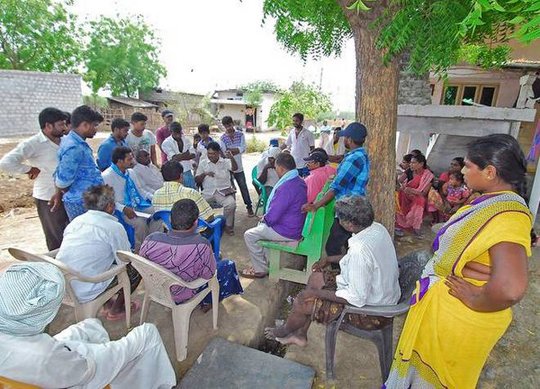Prakasam, Apr 26: Gonugunta, a small village in Prakasam district of coastal Andhra is in the news for reasons not so encouraging. Dozens of Dalits in the village are facing social boycott from upper caste Hindus.

Trouble began after the upper caste Hindus excluded two Dalit hamlets attached to the main village from the “Bottu Rayi” installation function on April 21. Now the Daits are denied access to water, medicines, groceries and other essential commodities.
The poor Dalits allegedly incurred the wrath of the upper caste Hindus after they objected to fixing the village boundaries excluding the two Dalit hamlets. Consecration of “'Bottu Rayi”(sanctified stone) is a Dravidian practice to ward off evil forces and ensure prosperity of residents of the village. Eight stones are also placed in eight different directions as advised by Vasthu experts to fix the village boundary.
“We are also born and brought up in the village, but are not treated as part and parcel of the village now. Even dogs are allowed to roam freely in the village. But we are disallowed for questioning them. We are not allowed to board the auto-rickshaws plied by “caste” Hindus, who have stopped talking to us now,” said a group of Dalits.
“They do not sell milk to us any longer,” complained K. Kalyan, on whose complaint the Chimakurthy police registered a case under SC/ST Prevention of Atrocities Act.
They now have no option but to go all the way to Chimakurthy or K.V. Palem to purchase essential commodities, added sarpanch K. Venkaiamma, also a Dalit.
“We are also not allowed to work in the farms of upper caste people,” complains a Dalit youth Vinod, getting ready to move out to Hyderabad where his friends eke out a living doing sundry jobs.
Only in 2008, the Dalits were allowed entry into the temple after the Kula Vivaksha Porata Sangam (KVPS) took up their cause.






Comments
Add new comment